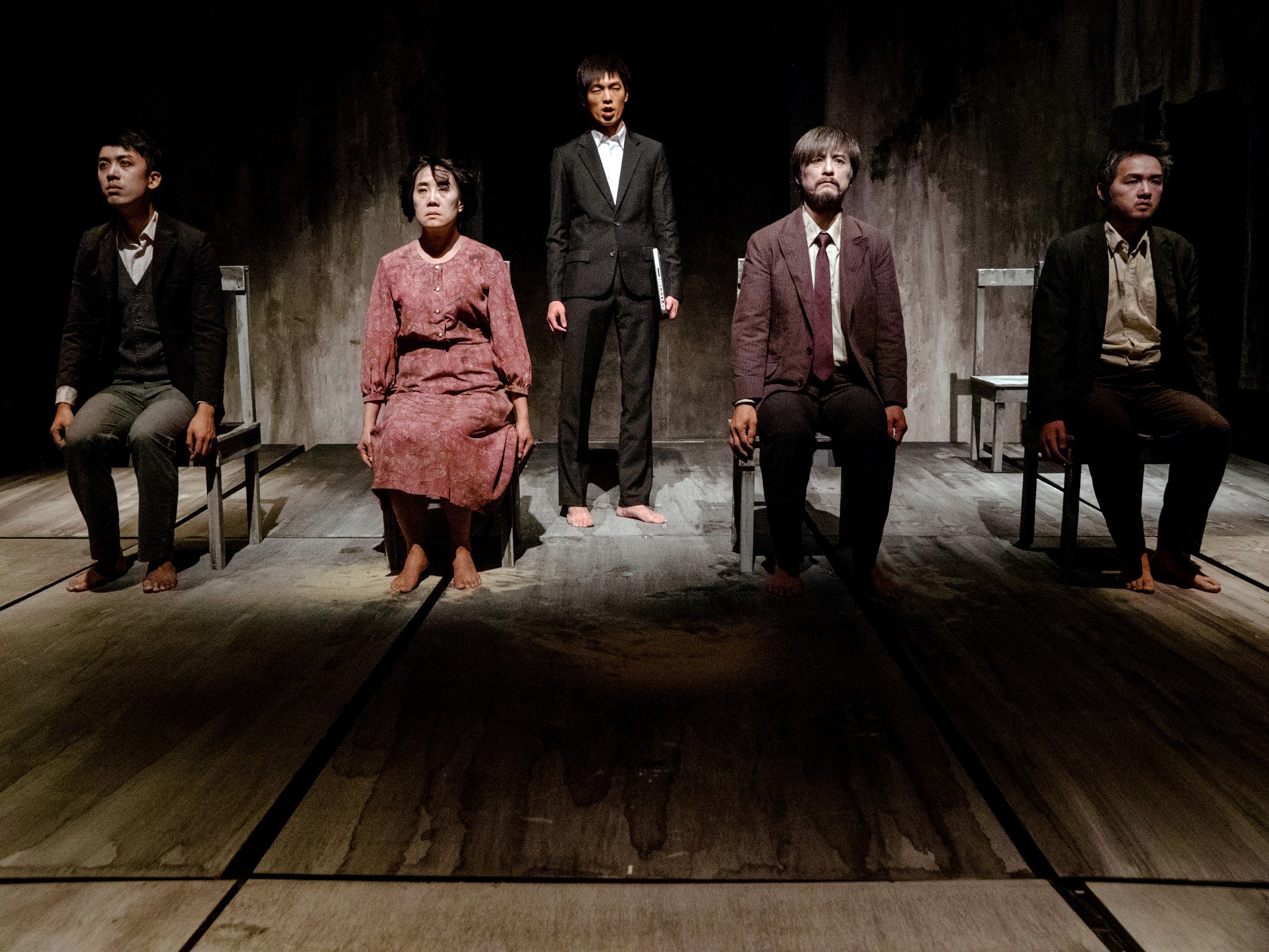「家」是什麼──在諾貝爾文學獎得主尤金.奧尼爾「舊恨消泯、血淚而書」的自傳性名作《長夜漫漫路迢迢》中,那是一個夾雜著人與人之間眾多親密關係、複雜情感的地方,一個你我倍感熟悉又時想疏離的地方。他利刃般的文字剖示一己靈魂,留下一幕幕震撼後人心靈的場景。在劇作家逝世六十年後,台灣導演王墨林爬梳大師經典與其傳記的人間糾葛,提出一份全新文本,於2013年澳門藝術節,帶領澳門的演員們,以及台灣、澳門兩地的藝術家,真誠演繹出一家人那份強烈的疏離與孤寂之餘,道盡藝術之中最為纖細的愛與理解。
「彷彿是一場處在兩個時空的靈魂在對話」──於2015台灣國際藝術節演出以亞洲巡演的全新視覺意象登場,帶領觀眾感受到跨越文化的生命顫動。
What is "Home"? In Long Day’s Journey into Night, the autobiographical masterwork by celebrated American playwright Eugene O’Neill and "a play of old sorrow, written in tears and blood", the Noble laureate exposes us to the nature of "Home": Home—the co-existence of mutual reliance and struggle, of difficult love and solid hate; Home—a place of complex relationships and affairs, a place you know well but sometimes want to escape.
In 2013, the 60th anniversary of O’Neill’s death, Taiwan theatre director Wang Mo-lin re-examined his classics and biographies, and produced a whole new text Wall of Fog performed in the 2013 Macao Arts Festival. Along with a cast and crew from Taiwan and Macao, Wang presents us with unique performing aesthetic and an opportunity for intellectual introspection, initiating a brand new dialogue between audience and stage. Aside from the strong sense of detachment and psychological isolation, it also tells the most subtle understanding of the quintessence of this long-lived play.
身體氣象館Body Phase Studio
台灣非營利跨文化交流之先驅藝術團體。於1991年由台灣小劇場先驅人物王墨林所組成,1991年創立迄今,以國際藝術節策畫與劇場製作,成就台灣與世界各地的藝術家彼此交流,進行多面向的美學思辨,為台灣劇場於小劇場運動之後,全新開啟與世界對話之窗。
The Body Phase Studio is a revolutionary non-profit Taiwanese arts group dedicated to international cultural exchange. It was founded by Wang Mo-Lin, a pioneer of independent theatre in Taiwan. Since its establishment in 1991 till today, by hosting various international arts festivals and theatrical productions, it has enabled Taiwanese artists to exchange aesthetic ideas and perspectives with their international counterparts. It can be said the studio has opened a window to the world for local theatre professionals following the Independent Theatre Movement of the 80s.
王墨林
高俊耀(馬來西亞)
劉婉薇(澳門)、陳世平(澳門)、梁奮佳(澳門)、何志峰(澳門)、梁健婷(澳門)、劉宇亨(澳門
姚立群、李銳俊(澳門)
葉穎雯(澳門)、王永宏
何志峰(澳門)、高俊耀(馬來西亞)
黃愛國(澳門)
王明輝
鄭文仔(香港)
區秀詒(馬來西亞)、李少莊(澳門)
李祉霖(澳門)
張剛華
許宗仁、陳冠霖
張以沁
許斌
許斌、梁祖賢(澳門)、Chris Hong(澳門)、施援程(澳門)
劉季易、陳正華、徐建宇、陳人碩、倪長明、陳俞臻、林晉毅、蔡承翰、林子謦
蔡嘉誠(馬來西亞)
張芝維
彭珮瑄
陳昱君、林育全、瓦旦塢瑪、彭曉筠
國家兩廳院實驗劇場
關鍵字
- 戲劇
評審談作品
比家族幽靈更晦暗的國族幽靈。
入圍理由 Reason for Nomination
西方經典如何需要我們,而不只是我們需要西方經典?這齣戲以巨大的力道做出回答。王墨林深挖尤金‧奧尼爾的書信、詩和日記,探測到原著裡、比家族幽靈更晦暗的國族幽靈,並且在劇場中,以死屋的空間感和著魔的身體性,堆疊出比家庭衝突更令人屏息的死亡感性。王墨林此番對於經典的詮釋,讓《長夜漫漫路迢迢》不只是家庭崩解的悲劇,不只是國族崩壞的寓言,更是這個資訊爆炸、感性匱乏的年代,一則集體沉淪的死亡紀事。如同奧尼爾透過這齣戲傾訴對家人苦澀的愛,《長夜漫漫路迢迢》也是王墨林給台灣的懺情書。提名觀察人—郭亮廷
Could it be possible that the Western classics need us more than we need them? This work answered this question with powerful intensity. WANG Mo-Lin explored Eugene O’Neill’s correspondence, poetry, and diary, and unearthed a national spirit that was murkier than the family ghost in the original work. In the theater, he used the spatiality of a deathly house and the possessed body to construct a sensibility of death that made the audience hold their breath even more than the domestic conflict in the work did. Through his interpretation of the classic, Wall of Fog was not just a tragedy of a collapsing family, or an allegory about the breakdown of a nation, but a chronicle of death that has recorded the collective demise in an information-exploded age devoid of sensibility. As the play was O’Neill’s profession of bittersweet affection for family, Wall of Fog was WANG Mo-Lin’s confession for Taiwan. (Commentator: KUO Liang-Ting)
年度入選獎得獎理由 Jury’s Statement on Award Winners
以台灣導演、澳門演員的組合,重新詮釋美國劇作家尤金.奧尼爾的自傳性名作,將家的親密與疏離、陰鬱與扭曲,鋪展得淋漓盡致。以個人深層情感與西方經典對話,暗涉台灣處境。
全劇瀰漫著死亡氣息,彷若倒數計時的水滴聲浸蝕著這片荒蕪。人物獨語式的對白相互疏離,隔膜般的肢體對位,呈顯親近的困難。劇中核心角色的母親,以畸變狂亂的精神特質,作為愛與罪的象徵。此劇回應了奧尼爾的自我救贖,亦回叩王墨林一貫創作脈絡關切的精神性存在與國族關懷。
This combination of a Taiwanese director and Macau performers re-interpreted the autobiographical masterpiece of the American playwright, Eugene O’Neill. The work fully demonstrated the sense of intimacy and aloofness, as well as, the gloom and distortion in a home, creating a dialogue between deep, personal emotions dramatized in the Western classic, while beckoning at the situation of Taiwan.
An air of death prevailed in the entire performance, as if the dripping water was counting down to the end and eating away the desolation. The monologic dialogues distanced the characters from each other; the movements evoked a membrane-like confinement, depicting the difficulty of intimacy. The deformed, wild psychological quality of the core maternal protagonist in the performance symbolized her love and sin. This play not only responded to the self-redemption in O’Neill’s work, it also echoed the spiritual existence and nationalistic concerns that WANG Mo-Lin’s oeuvre has always addressed.




